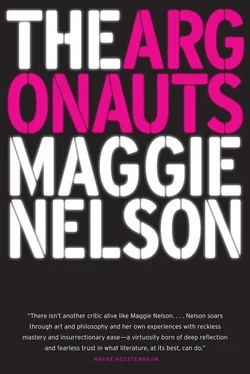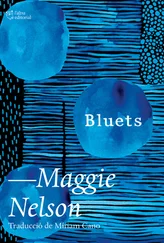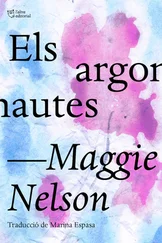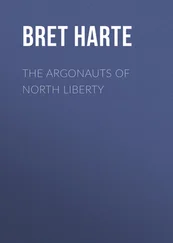My college professor of feminist theory was named Christina Crosby. I tried my very hardest in her class and she gave me an A-. I didn’t get it then but now I do. I was cruising for intellectual mothers, unconsciously gravitating toward the stern and nonmaternal type. Christina would show up for class on her motorcycle or sleek road bike, blow into the room with her helmet under her arm, the whip of autumnal New England in her hair and cheeks, and everyone would quake with intimidation and desire. I always think of her entrances when I start a class now, as she always showed up just a smidgen late — never actually late, but never the first one to the party. She was radiant and elegant and butch, not stone and not soft, just her own blond, professorial, athletic, windswept kind of butch.
Christina, too, had a habit of blushing deep red while she spoke for the first few minutes of class. It didn’t make her any less cool. In fact it made us think she ran hot on the inside, that something about her passion for Gayatri Spivak or the Combahee River Collective was uncontainable. And it was. Because of her blushing, I don’t feel any substantive shame when this happens to me now, in the classroom. (It happens to me all the time.)
Eventually Christina and I became friends. A few years ago, she told me the story of a subsequent feminist theory class that threw a kind of coup. They wanted — in keeping with a long feminist tradition — a different kind of pedagogy than that of sitting around a table with an instructor. They were frustrated by the poststructuralist ethos of her teaching, they were tired of dismantling identities, tired of hearing that the most resistance one could muster in a Foucauldian universe was to work the trap one is inevitably in. So they staged a walkout and held class in a private setting, to which they invited Christina as a guest. When people arrived, Christina told me, a student handed everyone an index card and asked them to write “how they identified” on it, then pin it to their lapel.
Christina was mortified. Like Butler, she’d spent a lifetime complicating and deconstructing identity and teaching others to do the same, and now, as if in a tier of hell, she was being handed an index card and a Sharpie and being told to squeeze a Homeric epithet onto it. Defeated, she wrote “Lover of Babe.” (Babe was her dog, a mischievous white lab.)
As she told me this story, I cringed all over — for the students, mostly, but also because I was remembering how, when I was Christina’s student, we had all wanted her to come out in a more public and coherent fashion, and how frustrated we were that she wouldn’t. (Actually, I wasn’t all that frustrated; I’ve always sympathized with those who refuse to engage with terms or forums that feel like more of a compromise or distortion than an unbidden expression. But I understood why others were frustrated, and I sympathized with them, too.) Her students’ frustration with her reticence about her personal life did not diminish their desire for her, however — sentiments such as “Christina Crosby’s leather pants make me wet” appeared regularly on the cement paths all over campus. Likely her reticence but fed the fire. (Christina admitted to me later that she knew about the chalkings, and that they had pleased her very much.)
But as the times changed, Christina changed. She got together with a younger, more activist scholar who is more vocal about queer issues, about being queer. Like most academic feminists, Christina now teaches “gender and sexuality studies” rather than women’s studies. Perhaps most moving to me, she is now writing autobiography — something she never would have dreamed of doing back when she was my mentor.
Back then, she said she was willing to be my thesis adviser because I struck her as serious, but she made it very clear that she felt no kinship — indeed, she felt a measure of repulsion — at my interest in the personal made public. I was ashamed, but undaunted (my epithet?). The thesis I produced under her tutelage was titled The Performance of Intimacy . I didn’t mean the word performance in opposition to “the real”; I’ve never been interested in any sort of con. Of course there exist people who perform intimacy in ways that are fraudulent or narcissistic or dangerous or steamrolling or creepy, but that’s not the kind of performance that I meant, or the kind I mean. I mean writing that dramatizes the ways in which we are for another or by virtue of another , not in a single instance, but from the start and always.
When it comes to my own writing, if I insist that there is a persona or a performativity at work, I don’t mean to say that I’m not myself in my writing, or that my writing somehow isn’t me. I’m with Eileen Myles—“My dirty secret has always been that it’s of course about me.” Lately, however, I have felt myself awash in a fresh irony. After a lifetime of experimenting with the personal made public, each day that passes I watch myself grow more alienated from social media, the most rampant arena for such activity. Instantaneous, noncalibrated, digital self-revelation is one of my greatest nightmares. I feel quite certain that my character is too weak to withstand the temptations and pressures that would come with hoisting it onto the stage of Facebook, and truly amazed by the fact that so many others — or all others, so it sometimes seems — bear it so easily.
More than bear it — celebrate it, intrepidly push at its limits, just as they should. In The Buddhist —which was created from blog posts — Dodie Bellamy hails the blog of poet Jackie Wang, who once posted her thoughts as they decomposed under the influence of Ambien: “6am. hello. fading fast because i took an ambien and am becoming incoherent. but the nice thing about ambien is that you can write and write and write because you don’t give a fuck, it;s good for the loosening that needs to happen in order to speak…. i was going to wrier sometrgiubf important but i snasccan6y cant read nmyg own handwriting and i hallucinate when i look at things.” Intellectually, I’m right there with Dodie, cheering Jackie on. But in my heart I’m saying a prayer of gratitude: it was an act of grace that I got sober before I got wireless.
I haven’t really thought this through (in homage to Wang?), but when I think about my more “personal” writing, I keep seeing that old Atari game, Breakout. I see the game’s plain, flat cursor sliding around on the bottom of the screen, popping the little black dot back onto the thick bank of rainbow above. Each time the dot hits the bank, it eats away a chunk of color, until eventually it has eaten away enough of the bank to “break out.” The breakout is a thrill because of all the triangulation, all the monotony, all the effort, all the obstruction, all the shapes and sounds that were its predecessor. I need those colored bricks to chip away at, because the eating into them makes form. And then I need the occasional jailbreak, my hypomanic dot riding the sky.
In Christina’s feminist theory class we also read Irigaray’s famous essay “When Our Lips Speak Together,” in which Irigaray critiques both unitary and binary ways of thinking by focusing on the morphology of the labial lips. They are the “sex which is not one.” They are not one, but also not two. They make a circle that is always self-touching, an autoerotic mandorla.
This image immediately struck me as weird but exciting. And a little embarrassing. It reminded me of the fact that a lot of women can jerk off just by pressing their legs together on a bus or in a chair or whatever (I came this way once while waiting in line to see The Bitter Tears of Petra von Kant at Film Forum on Houston). While we were discussing Irigaray in class, I tried to feel the circle of my labial lips. I imagined every woman in the class trying to feel it too. But the thing is, you can’t really feel your labial lips.
Читать дальше












